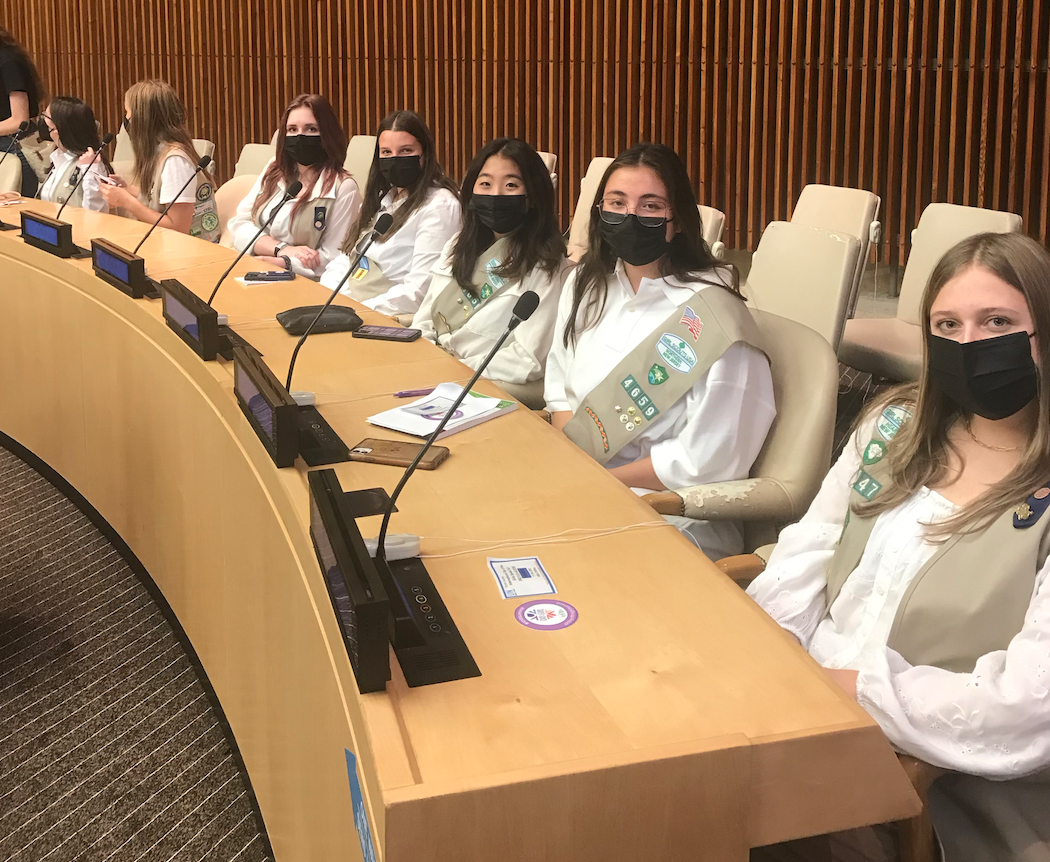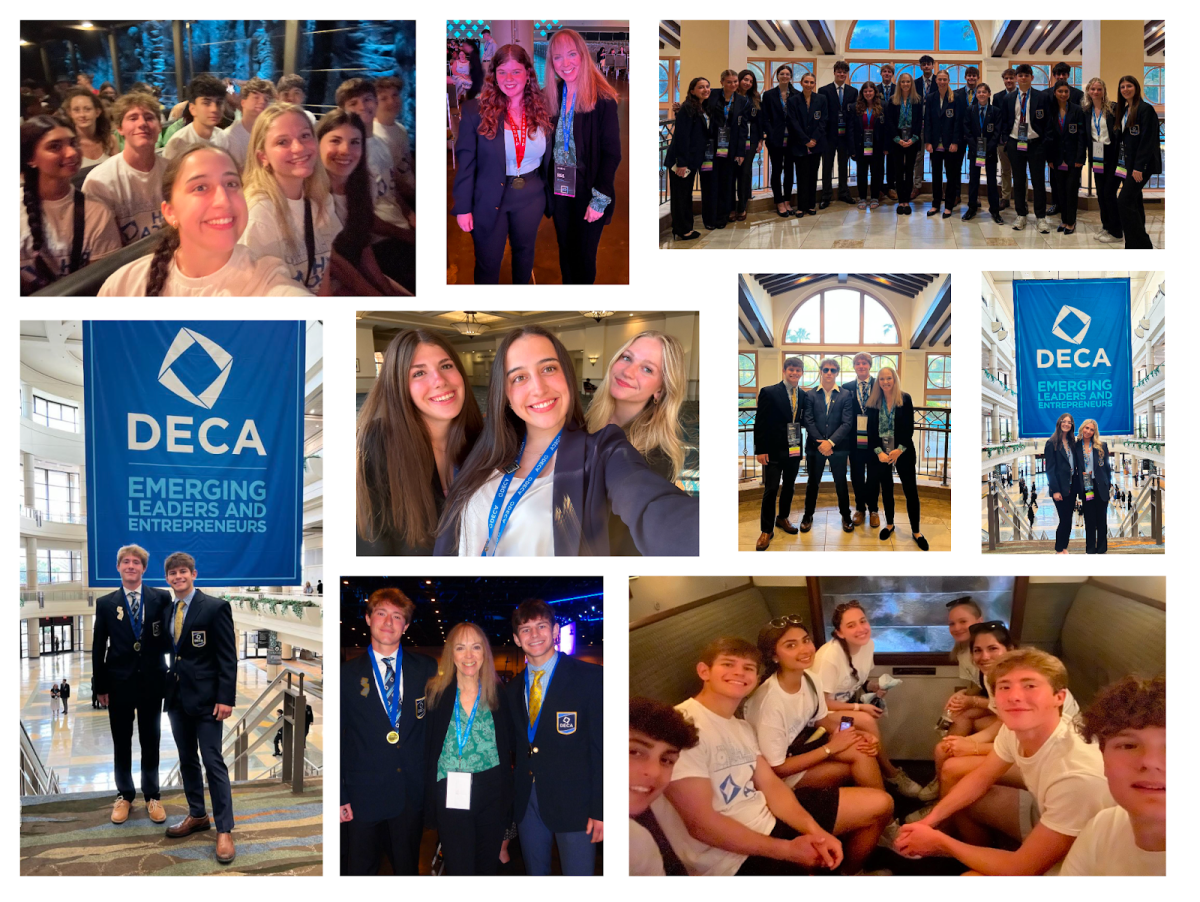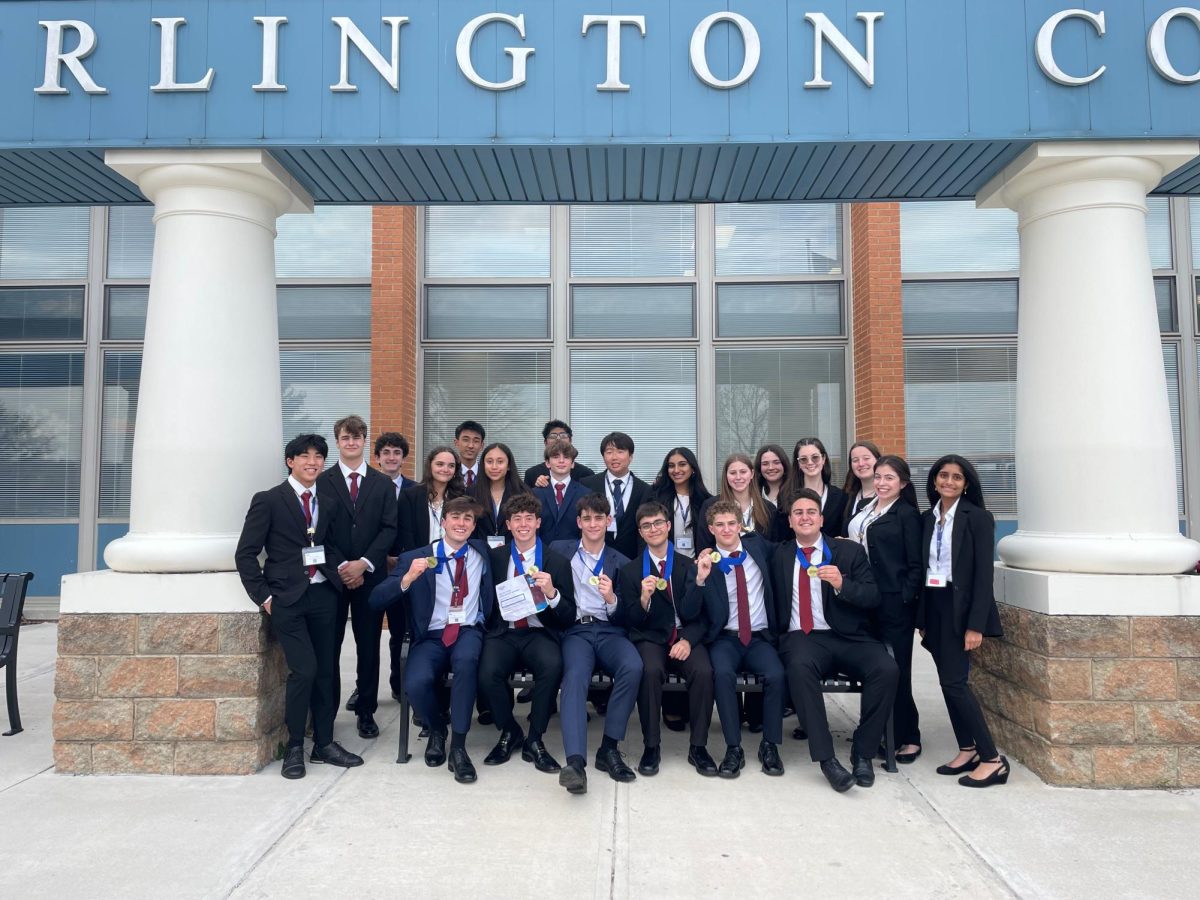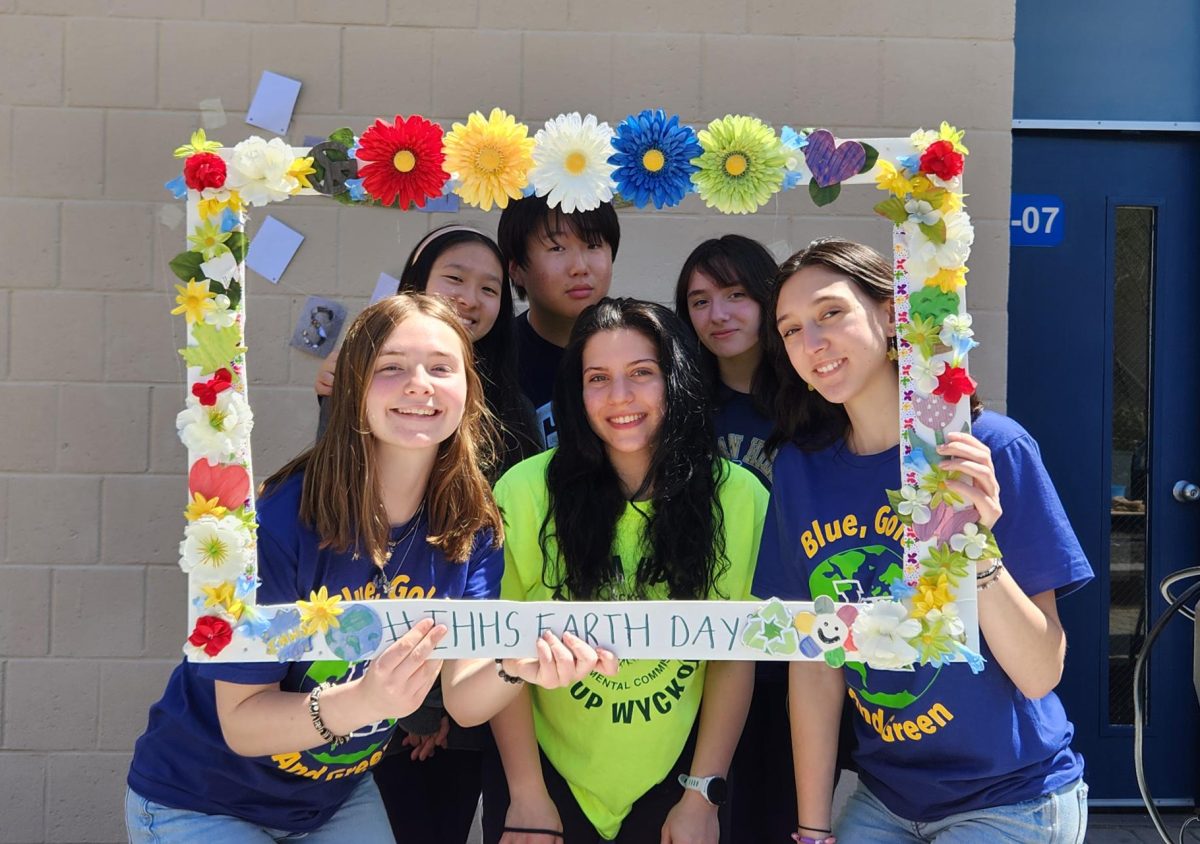‘23
On October 11, 2022, the United Nations hosted the 10th annual International Day of the Girl (IDG), bringing together women of the world in one room to discuss and advocate for women’s rights and equality. This discussion was led by female advocates and UN representatives about issues regarding access to education, survival, and protection against violence, and girls as agents of change. Participants, both virtually and in person, engage in this event from around the world, including UN representatives/policy makers from Canada, Peru, and Turkey, as well as UN Secretary-General, UN Women, United Nations International Children’s Emergency Fund (UNICEF), and The Working Group On Girls.
I attended this event, representing the Girl Scouts of the USA, sitting among a new generation of changemakers, advocates, and leaders. I was able to sit only feet away from the ambassadors of Peru and Canada, as well as representatives from world organizations such as UNICEF. I got to personally meet and talk to former Girl Scouts and current youth ambassadors of Austria. I got to hear inspiring stories of young women making change within their community, nation, and world, as well as the tragedies of those girls and women suffering from gender-based violence and inequity. The idea of the UN itself is a marvel to see in action. People from across the world come to one room, despite geographical, cultural, and linguistic barriers, to discuss imperative issues concerning the future of society. Even still, there are factors limiting the representation of voices from around the world in these international relations. An IDG moderator states, “10 years after the first celebration of the International Day Of The Girl, we are still fighting for the rights of girls around the world who cannot be here today. We do not have all 193 countries recognized by the UN represented by girls here today because of diverse factors such as lack of access to information, lack of access to the internet, oppressive governments, physical danger, and more.”
Although there has been much change in the social and political state of the world, there is much that still remains the same. UN representative of Canada, Robert Rae, states,
“No single social movement has been more important than the women’s movement around the world. It has impacted every one of us and has made an enormous difference in the rights, in the freedoms, the happiness, and in the futures of young women… Now that doesn’t mean we don’t face challenges around the world and at home… but it also celebrates the critical importance of including young girls in gender equality movements because it’s those movements that have made all the difference, and if I may say so, thinking of what is happening in Iran today, and also what is happening in Afghanistan and many other parts of the world, the cause of freedom is being led by women, the cause of equality is being led by women, and all of us have to recognize that and celebrate it for the wonderful thing that it is.”
Even so, while many of the members of this event are privileged to have this platform to raise their voices and have these opportunities and education, many young women around the world remain oppressed and without proper access to education. As Maka Chikowero, IDG moderator and girl advocate from Zimbabwe, stated, “more than 62 million girls are out of school right now, and millions more are fighting to stay in school. In rural zimbabwe, where my organization operates, an extra hurdle is that families must be able to afford and be willing to pay tuition, this is in part because of the value placed on educating a girl vs educating a boy.” The COVID-19 pandemic has only enhanced the lack of access due to the digital divide. Education is essential for the safety and well-being of everyone, male, female, and non-gender conforming. Every year of instruction is a year of additional empowerment. As the ambassador of Turkey, Feridun Hadi Sinirlioğlu, clarifies, if we are all truly sincere in our efforts to raise a generation that will lead to successful, confident women of the future, our goal should be, through education, to equip every girl with the courage and skills to exercise their power.
Even still, this disparity of power and education between genders remains substantial. According to UN Women estimates, based on the current rates of progress, women will not achieve full equality with men for another 300 years. It is up to us to break this trend and speed up this progress by eliminating harmful practices that deem women submissive, subservient, and inferior, such as beligome, child marriages, domestic abuse, trafficking, and more. Here are some shocking statistics regarding gender-based violence, as shared at the International Day of The Girl:
“Globally 12 million girls a year are being raped under the guise of early child marriages, which is one girl every 3 seconds.”
“In the United States, 84% of native women will experience violence in their lifetimes. They go missing and are murdered at rates 10x higher than the national average. Despite this, 95% of these cases go undocumented by national news media.”
“According to the UN, 81000 girls and women were killed in 2020. And 58% of these deaths were at the hands of abusive partners or family members.”
Many of us will ever know the suffering that these women endure, but it is up to us to try to understand, which begins with listening to the voices, stories, and struggles of girls and women around the world. In many of these cases listed above, legislation has failed them, mainly because the legislation does not exist in these nations. In addition, these girls are not just raped, molested, or abused—they are also shamed into a culture of silence. Because of this, it is up to other women to speak for those who do not have a voice, showing that life can be better.
The main feature of the International Day of the Girl is hearing from young women across the globe who have demonstrated their leadership, determination, and passion for a better world through founding their own initiatives and organizations. 17-year-old Maka Chikowero from Zimbabwe founded and is president of MTC EDUCATE A Girl INC (MTC), a non-profit organization operating in rural and peri-urban areas of Zimbabwe. She spoke about her and the organization’s efforts to support girls and women living in these communities by promoting education, health, and sports participation, and eliminating early child marriages. Through MTC and various stakeholder efforts, the Zimbabwe government passed a marriage amendment bill in March 2020 that prohibited the marriage of underage girls.
Another young changemaker, Annmaria Antony, started her initiatives as part of the Girl Scouts Gold Award, the highest award a Girl Scout can achieve. With the help of volunteers, Annmaria designed and programmed a software platform that matches rural hospitals with pre-registered blood donors. Today it has been adopted by 24 hospitals and amassed 11,000 individual donors in rural India. In addition, she has also started another organization, Allies Against Abuse, nonprofit serving victims of domestic violence in Uganda. After raising $30,000 dollars, the organization collaborated with the district council and the women of the community to design and build a hospital accommodating up to 100 patients–the first in its village to offer healthcare and resources prioritizing local girls and women. Initiatives like those of these inspiring young women show how one person can incite a chain of events to make a difference and that by working together people can challenge the status quo.
But that change can also start with women empowering themselves. UNICEF Deputy Executive Director Karin Hulshof comments that it is equally important for girls to empower themselves and each other to influence their own lives and develop themselves to be better equipped for societal challenges. Even by opening up the conversation to these important subjects, we already are promoting change. Feridun Hadi Sinirlioğlu states, “I am proud to see at a very young age, you have realized what many others have turned a blind eye to.”
Female empowerment is about telling the stories that are not being told. It is about embracing being a woman, saying “I am a girl. I am a leader. And I am not alone.” It is not only up to the world’s decision-makers but up to girls and women to be accountable for defending our rights. Speaking out is not easy, especially in countries where women are oppressed and live in a culture of silence. “Unity that is necessary to make further progression gender equity and girls’ rights; however, it is also necessary to recognize the urgent manner in which the issues discussed today need to be resolved”, an IDG moderator explains, “We urge all of the policymakers present today to remember that the call from girls around the world is girls rights now. Not girls’ rights tomorrow or in another 10 years.”
Richard Arbeiter, UN Ambassador and Deputy Permanent Representative of Canada, explains, it all starts with the individual. Although there are certainly systematic barriers limiting equality, these systems are made of individuals who make decisions every day and are accountable for those decisions. The elimination of those systematic barriers equally relied on individuals changing their decisions by listening to the voices of those around them. Arbeiter goes on to say, “I believe inclusion is not an endpoint, it is a mindset. And that inclusion starts in ‘I’.”
It is upon all of us, no matter your gender, to implement skills of understanding in our lives in order to be agents of change. This conference has shown me that there are millions of voices being oppressed and millions of stories going untold. As students and as human beings, it is our responsibility to educate ourselves and uphold the decorations of humanity by promoting equality and respect in our everyday lives.





